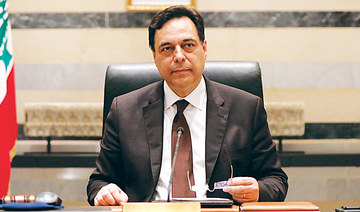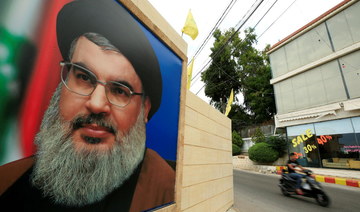BEIRUT: Christine Tohme had already been diagnosed with ovarian cancer when Lebanon’s financial system began to unravel in 2019. She never expected that two years later her country’s economic meltdown would pose a direct threat to her life.
The 50-year-old was later diagnosed with third stage colon cancer in February. Having undergone surgery earlier this year, she was then prescribed six sessions of chemotherapy.
But with shortages of basic goods plaguing every aspect of Lebanese life, Tohme was told there was no guarantee she would complete her treatment as hospitals run out of vital drugs.
So far she has only undergone three sessions. Her cancer has metastasized to her lymph nodes and she fears if she cannot complete her treatment she will only have months to live.
Having knocked on every door to try to secure her medication at any cost, Tohme took to the streets on Thursday, despite her ailing health, to join a sit-in protest with other cancer patients, doctors and nongovernmental organizations.
“I’m hoping that God gives me strength, as I don’t have that much, to stand on my two feet and take part so that maybe people will see us and sympathize with us and send us treatment,” Tohme told Reuters two days before the event. “I have kids, I want to be happy with them and see them get married and become a grandmother.”
Lebanese healthcare workers have warned for months of declining stocks of vital medical supplies. Many pharmacy shelves are empty as the country’s foreign reserves are depleted on the back of a subsidy scheme used to finance fuel, wheat and medicine that cost the state around $6 billion a year.
This month the central bank declared it could no longer finance fuel imports at subsidized exchange rates because its dollar reserves had been so badly depleted.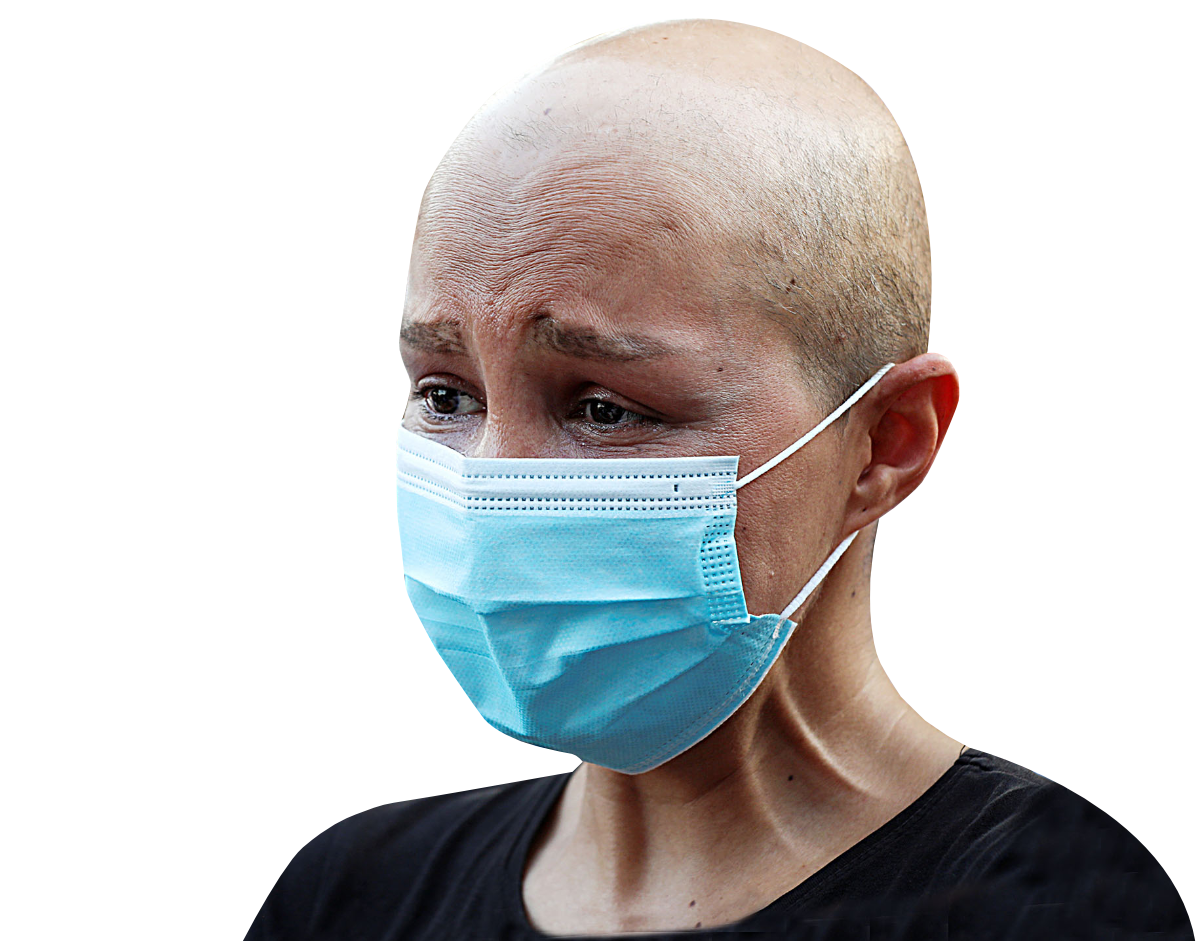
Tohme’s case is not unique. Dr. Joseph Makdessi, who heads the hematology and oncology department at the Saint George Hospital University Medical Center, estimates around 10 percent of cancer patients have been unable to source their treatment in the past couple of months.
“We need an immediate solution,” Makdessi said. “I can’t tell my patients this is a crisis and ask them to wait till it eases because this disease has no patience.”
Lebanon’s deeply indebted state is struggling to raise funds from abroad amidst political paralysis and has gradually eradicated many subsidies.
But cancer medications are still subsidised, meaning in order for agents to import them they have to wait for financing from the central bank, which has all but run down its reserves.
Yet Dr. Makdessi isn’t optimistic that easing subsidies on cancer drugs will solve his patients’ pressing problem.
Some chemotherapy treatments, which can cost as much as $5,000 per session, are currently subsidized so the patient pays around $400, with the state bearing the rest of the cost.
“Even if you lift this subsidy to make the medication available, many patients won’t be able to afford it,” he said.
The Health Ministry did not immediately respond to a request for comment.
Caretaker Health Minister Hamad Hassan, who has been raiding depots storing large quantities of drugs and medical supplies, partly blamed the shortages on traders hoarding supplies.
The Barbara Nassar Association for Cancer Patient Support, the Lebanese advocacy group that organized Thursday’s sit-in, has provided medication worth more than $1.5 million in 2020 through in-kind donations from former patients.
But now Hani Nassar, whose wife Barbara founded the organization before passing away from the disease years ago, says the country’s fractious politics is hampering efforts to alleviate the problem.
“The central bank wants to remove the subsidy and the Health Ministry doesn’t and in the meantime the patient is sitting there without treatment,” Nassar said.
At Thursday’s sit-in, patients said they were reaching out to whoever could help them get a second chance at life. “After all I endured, I lost my nails and hair and my body changed, now I reached this point of not finding the treatment and this really set me back,” engineer Bahaa Costantine said.
“I was a person who was full of energy and loves life, I don’t want to be a bride for heaven, this is what I refuse. I hope my voice reaches someone who can help.”
Clock ticking for Lebanese cancer patients as shortages bite
https://arab.news/vrpbq
Clock ticking for Lebanese cancer patients as shortages bite
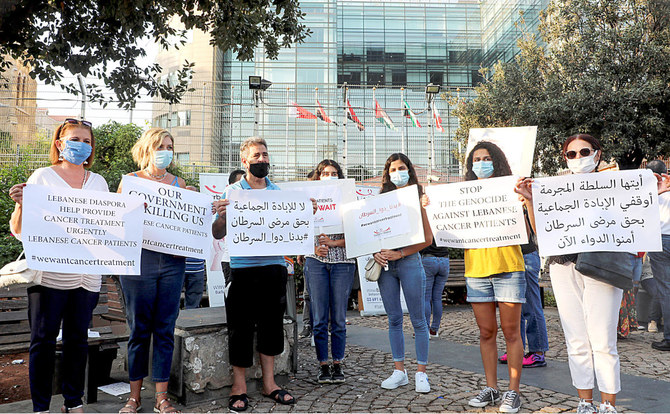
- "We need an immediate solution. I can’t tell my patients this is a crisis and ask them to wait till it eases because this disease has no patience"
Oil tanker hit by missile off Yemen: security firm
“A Panama-flagged crude oil tanker was reportedly ‘attacked’” about 10 nautical miles southwest of Mokha, Ambrey said, adding that information “indicated the vessel was hit by a missile and that there was a fire in the steering gear flat.”
The British navy’s maritime security agency had earlier said it received a report of a vessel “sustaining slight damage after being struck by an unknown object.”
“The vessel and crew are safe and continuing to its next port of call,” United Kingdom Maritime Trade Operations (UKMTO) added.
It said the incident occurred 76 nautical miles (140 kilometers) off Yemen’s Hodeidah, without specifying the type of vessel involved.
The Iran-backed Houthi rebels, who control much of Yemen, have launched dozens of attacks on vessels in and around the Red Sea since November in a campaign they say is in solidarity with Palestinians in war-torn Gaza.
The rebel attacks have prompted reprisal strikes by US and British forces and the formation of an international coalition to protect the vital shipping lanes through the Gulf of Aden and the Red Sea.
Israeli forces kill senior Palestinian militant in Jenin: army

- The strike by a fighter jet and helicopter killed Islam Khamayseh
- Khamayseh was a leader of the Jenin Battalion
RAMALLAH: The Israeli military said on Saturday it killed a senior Palestinian militant during an air strike on an “operations center” in the occupied West Bank city of Jenin.
“A number of significant terrorists were inside the compound,” the Israeli Defense Forces said in a statement posted to Telegram.
It said the strike by a fighter jet and helicopter killed Islam Khamayseh, a “senior terrorist operative in the Jenin Camp” who was responsible for a series of attacks in the area.
The Al-Quds Brigade, the armed wing of militant group Palestinian Islamic Jihad, confirmed in a statement that Khamayseh was killed and several others wounded during an Israeli raid on Friday night.
It said Khamayseh was a leader of the Jenin Battalion, which is affiliated with Islamic Jihad.
The Palestinian Ministry of Health said one person was killed and eight were wounded and receiving hospital treatment as a result of Israel’s operation in Jenin on Friday night.
Israel has occupied the West Bank since 1967 and its troops routinely carry out incursions into areas such as Jenin, which are nominally under the Palestinian Authority’s security control.
The West Bank has seen a recent surge in violence, particularly since the Israel-Hamas war erupted on October 7.
More than 500 Palestinians have been killed by Israeli forces or settlers across the West Bank since October 7, according to Palestinian officials, and at least 20 Israelis have been killed over the same period, according to an AFP tally based on official Israeli figures.
The Gaza Strip has been at war since Hamas’s unprecedented attack on October 7 resulted in the deaths of more than 1,170 people in Israel, most of them civilians, according to an AFP tally based on official Israeli figures.
Israel’s retaliatory offensive on the Hamas-ruled Gaza Strip has killed at least 35,303 people, most of them civilians, according to the Hamas-run territory’s health ministry.
Fierce fighting in northern Gaza as aid starts to roll off US-built pier

- Residents say Israeli bulldozers demolishing homes, shops in Jabalia
- Hamas says US floating aid pier no substitute for end to Israeli siege
CAIRO: Israeli forces battled Hamas fighters in the narrow alleyways of Jabalia in northern Gaza on Friday in some of the fiercest engagements since they returned to the area a week ago, while in the south militants attacked tanks massing around Rafah.
Residents said Israeli armor had thrust as far as the market at the heart of Jabalia, the largest of Gaza’s eight historic refugee camps, and that bulldozers were demolishing homes and shops in the path of the advance.
“Tanks and planes are wiping out residential districts and markets, shops, restaurants, everything. It is all happening before the one-eyed world,” Ayman Rajab, a resident of western Jabalia, said via a chat app.
Israel had said its forces cleared Jabalia months earlier in the Gaza war, triggered by the deadly Hamas-led attacks on southern Israel on Oct. 7, but said last week it was returning to prevent Islamist militants re-grouping there.
In southern Gaza bordering Egypt, thick smoke rose over Rafah, where an escalating Israeli assault has sent hundreds of thousands of people fleeing from what was one of the few remaining places of refuge.
“People are terrified and they’re trying to get away,” Jens Laerke, UN humanitarian office spokesperson, said in Geneva, adding that most were following orders to move north toward the coast but that there were no safe routes or destinations.
As the fighting raged, the US military said trucks started moving aid ashore from a temporary pier, the first to reach the besieged enclave by sea in weeks.
The World Food Programme, which expects food, water, shelter and medical supplies to arrive through the floating dock, said the aid was transported to its warehouses in Deir Al Balah in central Gaza and told partners it was ready for distribution.
The United Nations earlier reiterated that truck convoys by land — disrupted this month by the assault on Rafah — were still the most efficient way of getting aid in.
“To stave off the horrors of famine, we must use the fastest and most obvious route to reach the people of Gaza – and for that, we need access by land now,” deputy UN spokesperson Farhan Haq said.
US aid was arriving in Cyprus for delivery to Gaza via the new pier, Washington said.
Hamas demanded an end to Israel’s siege and accused Washington of complicity with an Israeli policy of “starvation and blockade.”
The White House said US national security adviser Jake Sullivan would visit Israel on Sunday and stress the need for a targeted offensive against Hamas militants rather than a full-scale assault on Rafah.
A group of US medical workers left the Gaza Strip after getting stuck at the hospital where they were providing care, the White House said.
Humanitarian fears
The Israel Defense Forces said troops killed more than 60 militants in Jabalia in recent days and located a weapons warehouse in a “divisional-level offensive.”
A divisional operation would typically involve several brigades of thousands of troops each, making it one of the biggest of the war.
“The 7th Brigade’s fire control center directed dozens of airstrikes, eliminated terrorists and destroyed terrorist infrastructure,” the IDF said.
At least 35,303 Palestinians have now been killed, according to figures from the enclave’s health ministry, while aid agencies have warned repeatedly of widespread hunger and dire shortages of fuel and medical supplies.
Israel says it must capture Rafah to destroy Hamas and ensure the country’s safety. In the Hamas attack on Oct. 7, 1,200 people died in Israel and 253 were taken hostage, according to Israeli tallies. About 128 hostages are still being held in Gaza.
Israel said on Friday that its forces retrieved the bodies of three people killed at the Nova music festival in Israel on Oct. 7 and taken into Gaza.
In response, Hamas said negotiations were the only way for Israel to retrieve hostages alive: “The enemy will not get its prisoners except as lifeless corpses or through an honorable exchange deal for our people and our resistance.”
Talks on a ceasefire have been at an impasse.
‘Tragic war’
Israeli tanks and warplanes bombarded parts of Rafah on Friday, while the armed wings of Hamas and Islamic Jihad said they fired anti-tank missiles and mortars at forces massing to the east, southeast and inside the Rafah border crossing with Egypt.
UNRWA, the main UN aid agency for Palestinians, said more than 630,000 people had fled Rafah since the offensive began on May 6.
“They’re moving to areas where there is no water — we’ve got to truck it in — and people aren’t getting enough food,” Sam Rose, director of planning at UNRWA, told Reuters on Friday by telephone from Rafah, where he said it was eerily quiet.
At the International Court of Justice, or World Court, in The Hague, where South Africa has accused Israel of violating the Genocide Convention, Israeli Justice Ministry official Gilad Noam defended the operation.
The South African legal team, which set out its case for fresh emergency measures the previous day, framed the Israeli military operation as part of a genocidal plan aimed at bringing about the destruction of the Palestinian people.
Fierce fighting in northern Gaza as aid starts to roll off US-built pier

- Residents say Israeli bulldozers demolishing homes and shops in Jabalia in the path of the advance
- Hamas says US floating aid pier is no substitute for end of Israeli siege of Gaza
CAIRO: Israeli forces battled Hamas fighters in the narrow alleyways of Jabalia in northern Gaza on Friday in some of the fiercest engagements since they returned to the area a week ago, while in the south militants attacked tanks massing around Rafah.
Residents said Israeli armor had thrust as far as the market at the heart of Jabalia, the largest of Gaza’s eight historic refugee camps, and that bulldozers were demolishing homes and shops in the path of the advance.
“Tanks and planes are wiping out residential districts and markets, shops, restaurants, everything. It is all happening before the one-eyed world,” Ayman Rajab, a resident of western Jabalia, said via a chat app.
Israel had said its forces cleared Jabalia months earlier in the Gaza war, triggered by the deadly Hamas-led attacks on southern Israel on Oct. 7, but said last week it was returning to prevent Islamist militants re-grouping there.
In southern Gaza bordering Egypt, thick smoke rose over Rafah, where an escalating Israeli assault has sent hundreds of thousands of people fleeing from what was one of the few remaining places of refuge.
“People are terrified and they’re trying to get away,” Jens Laerke, UN humanitarian office spokesperson, said in Geneva, adding that most were following orders to move north toward the coast but that there were no safe routes or destinations.
As the fighting raged, the US military said trucks started moving aid ashore from a temporary pier, the first to reach the besieged enclave by sea in weeks.
The World Food Programme, which expects food, water, shelter and medical supplies to arrive through the floating dock, said the aid was transported to its warehouses in Deir Al Balah in central Gaza and told partners it was ready for distribution.
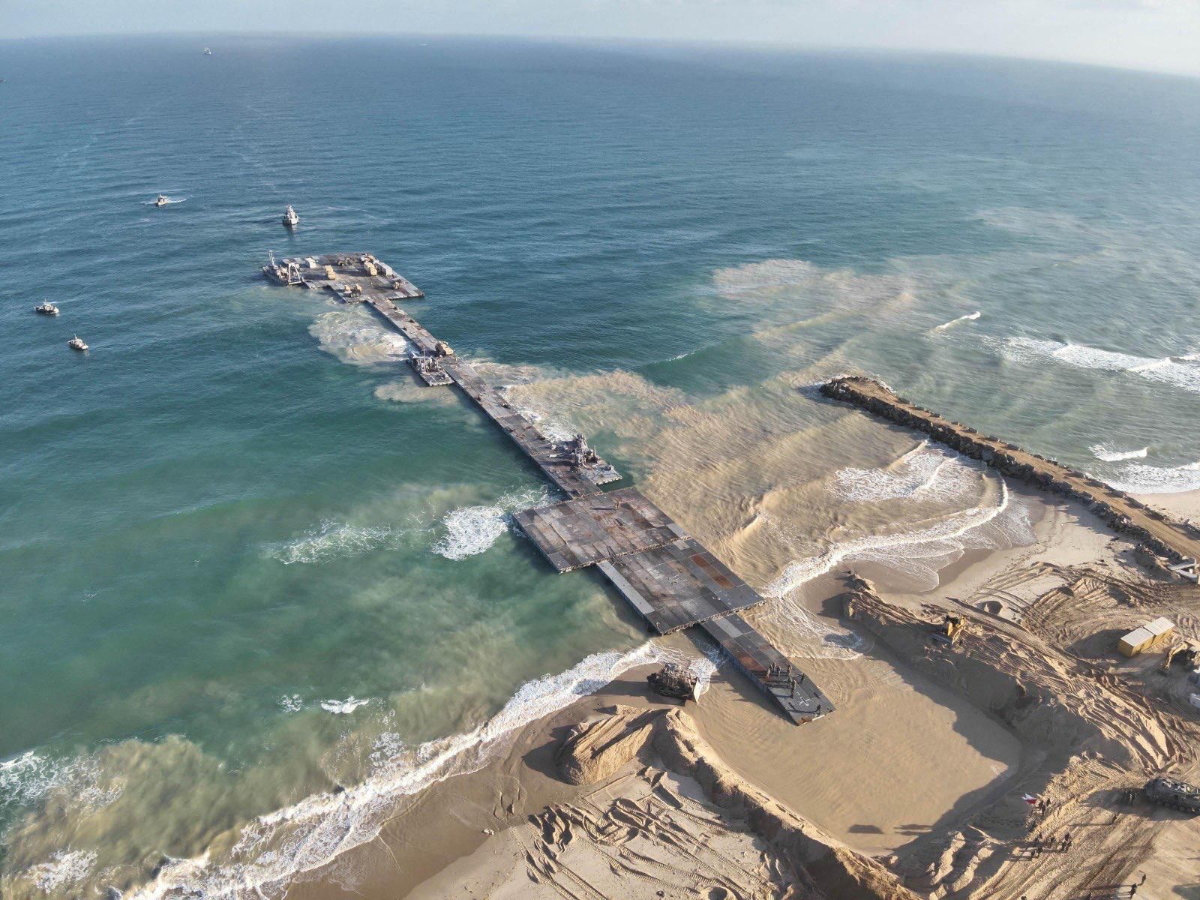
The United Nations earlier reiterated that truck convoys by land — disrupted this month by the assault on Rafah — were still the most efficient way of getting aid in.
“To stave off the horrors of famine, we must use the fastest and most obvious route to reach the people of Gaza – and for that, we need access by land now,” deputy UN spokesperson Farhan Haq said.
US aid was arriving in Cyprus for delivery to Gaza via the new pier, Washington said.
Hamas demanded an end to Israel’s siege and accused Washington of complicity with an Israeli policy of “starvation and blockade.”
The White House said US national security adviser Jake Sullivan would visit Israel on Sunday and stress the need for a targeted offensive against Hamas militants rather than a full-scale assault on Rafah.
A group of US medical workers left the Gaza Strip after getting stuck at the hospital where they were providing care, the White House said.
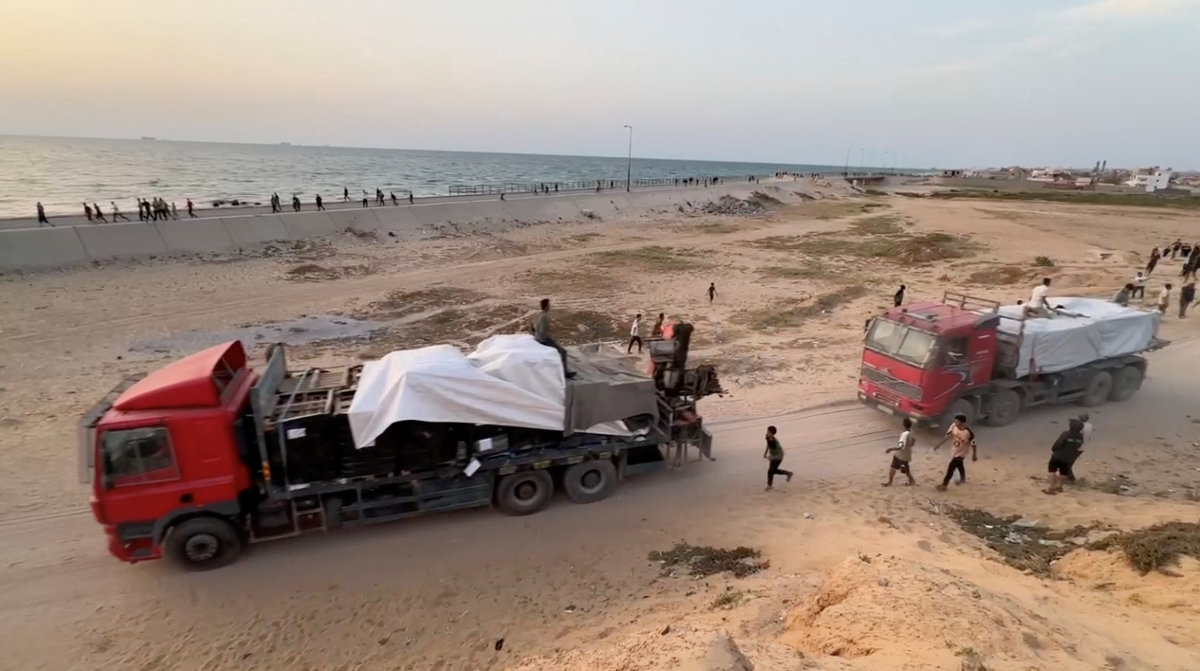
Humanitarian fears
The Israel Defense Forces said troops killed more than 60 militants in Jabalia in recent days and located a weapons warehouse in a “divisional-level offensive.”
A divisional operation would typically involve several brigades of thousands of troops each, making it one of the biggest of the war.
“The 7th Brigade’s fire control center directed dozens of airstrikes, eliminated terrorists and destroyed terrorist infrastructure,” the IDF said.
At least 35,303 Palestinians have now been killed, according to figures from the enclave’s health ministry, while aid agencies have warned repeatedly of widespread hunger and dire shortages of fuel and medical supplies.
Israel says it must capture Rafah to destroy Hamas and ensure the country’s safety. In the Hamas attack on Oct. 7, 1,200 people died in Israel and 253 were taken hostage, according to Israeli tallies. About 128 hostages are still being held in Gaza.
Israel said on Friday that its forces retrieved the bodies of three people killed at the Nova music festival in Israel on Oct. 7 and taken into Gaza.
In response, Hamas said negotiations were the only way for Israel to retrieve hostages alive: “The enemy will not get its prisoners except as lifeless corpses or through an honorable exchange deal for our people and our resistance.”
Talks on a ceasefire have been at an impasse.
’Tragic war’
Israeli tanks and warplanes bombarded parts of Rafah on Friday, while the armed wings of Hamas and Islamic Jihad said they fired anti-tank missiles and mortars at forces massing to the east, southeast and inside the Rafah border crossing with Egypt.
UNRWA, the main UN aid agency for Palestinians, said more than 630,000 people had fled Rafah since the offensive began on May 6.
“They’re moving to areas where there is no water — we’ve got to truck it in — and people aren’t getting enough food,” Sam Rose, director of planning at UNRWA, told Reuters on Friday by telephone from Rafah, where he said it was eerily quiet.
At the International Court of Justice, or World Court, in The Hague, where South Africa has accused Israel of violating the Genocide Convention, Israeli Justice Ministry official Gilad Noam defended the operation.
The South African legal team, which set out its case for fresh emergency measures the previous day, framed the Israeli military operation as part of a genocidal plan aimed at bringing about the destruction of the Palestinian people.
WHO says no medical supplies received in Gaza for 10 days

GENEVA: The World Health Organization said Friday that it has received no medical supplies in the Gaza Strip for 10 days as Israel pursues a new offensive against Hamas.
Israel’s closure of the Rafah crossing into Gaza has caused “a difficult situation,” WHO spokesman Tarik Jasarevic said. “The last medical supplies that we got in Gaza was before May 6.”
Israeli troops entered the city of Rafah on May 7 to extend their offensive against Hamas over the militant group’s attacks seven months earlier. They closed the Rafah crossing into Egypt that is crucial for humanitarian supplies.
With UN agencies warning of a growing risk of famine in Gaza, the Kerem Shalom and Erez crossings from Israel are also virtually shut down.
Jasarevic said the biggest concern was over fuel needed to keep clinics and hospitals running. Gaza’s health facilities need up to 1.8 million liters of fuel a month to keep operating.
The spokesman said only 159,000 liters had entered Rafah since the border closure. “This is clearly not sufficient,” he added, highlighting how only 13 out of 36 hospitals across the Palestinian territory were now “partially” operating.
“Hospitals still functioning are running out of fuel, and that puts so many lives at danger,” said Jasarevic. “Current military operations in Rafah are putting countless lives at risk.”
The Hamas attack on October 7 resulted in the death of more than 1,170 people in Israel, most of them civilians, according to an AFP tally based on official Israeli figures. Out of 252 people taken hostage, 128 are still held inside Gaza, but the army says 38 have died.
More than 35,300 people, mostly civilians, have been killed in the Palestinian territory since the war broke out, according to data provided by the health ministry of Hamas-run Gaza.



